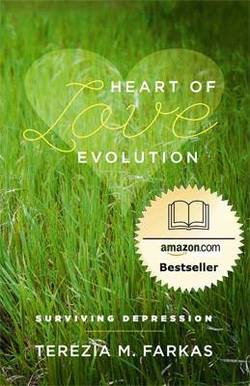2 Comments
Terezia Farkas. International Bestselling Author. Columnist. Writes about dealing with depression.
My latest article in the Huffington Post deals with farmer suicides. Farmers have the highest suicide rates of any occupation. I'm sharing my article on my website because the issue of farmer suicide needs to be talked about. The next time you're munching on that delicious corn or eating something that comes from a farm, think about this: Suicide rates in farmers are the highest of any occupation. That's an alarming statistic. So large are the number of farmer suicides that Max Kutner of Newsweek (April 10, 2014) called it an international crisis. It's a case where the job can kill you. CONTINUE READING.....  Terezia Farkas. International Bestselling Author. Columnist. Writes about dealing with depression. Herbicide use is being linked to depression among farmers and farmworkers by numerous university research studies. Farmers using herbicide are 2.5 times more likely to develop depression than farmers who don’t use herbicide. While researchers don’t want to say that the various chemicals in weedkillers actually cause depression, ongoing studies seem to suggest that the sheer amount of herbicide being used is not healthy. The use of pesticides has already been linked to Parkinson’s disease in farmers. Insecticides, particularly organophosphates, are toxic to nerve cells. New studies are now focusing on the use of herbicides and their effects on farmers. It’s believed that herbicides affect the mental health of farmers, possibly even their neural networks. In the United States, herbicide use makes up 65% of all agricultural pesticide use. The genetically engineered crops of Monsanto and other companies are designed to withstand the effects of herbicides. Large doses of these chemicals are often doused over these crops. Breathing in these harmful substances are farmers. In 2013 a study was conducted by The American Journal of Epidemiology. For the study, researchers surveyed 567 farmers from France, questioning them on the frequency of their use of fungicides, insecticides, and herbicides, to determine how pesticide exposures were linked to the risk of developing clinical depression. The findings revealed that among 567 farmers, 83 self-reported treatment or hospitalization for depression — nearly 15 percent. After adjusting for age and health factors, the researchers found that farmers who use herbicides were more than twice as likely to have been treated for depression. Lead researchers and associate professor at the Harvard School of Public Health, Marc Weisskopf, Ph.D., said while the results are unclear, they “suggest we should not be ignoring herbicides just because they’re targeting plants.” Terezia Farkas. International Bestselling Author, Huffington Post/ CNN contributor, columnist of Depression Help. Focus is mental health. Her bestseller Heart of Love Evolution – Surviving Depression is available on Amazon. Website: www.tereziafarkas.com Follow on Twitter. |

RECENT POSTS
All
BLOG ARCHIVES
February 2018
Terezia Farkas on Huffington Post
|



